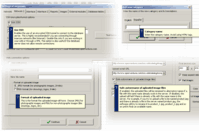|

Main browsing window (category tree on left side, product listing on right side).

Main browsing window with product-listing menu. You can modify several products at once. Also, you can enter
relative modifications which will change the values relative to the current ones.

Main browsing window, grouped operation window. You can modify several products at once and use
relative modifications like in this case (+20%) which will change the price of all
selected products raising them by 20% from their previous price.

Main browsing window with category-tree menu. You can easily add, rename or delete product categories.

Category editing window. You add or rename a category you can specify its name any language
available in your store (the application support up to 20 languages).

Product window, first tab. You can edit the main characteristics of the product.

Product window, second tab. You can edit the descriptions of the product per language.

Product window, third tab. You can delete or upload the product image.

Product window, third tab. Upload dialog. You select the source image, the output format and the name to be used in the
web server (usually the suggested one is Ok). When you push the Upload button the application will
load the source image, resize it, pad it, convert it and load it to the web server).

Product report. You can print the selected products as a printed report. Here you can see the preview
window before confirming the printing. The default report is fully configurable via the report editor.

Configuration window, first tab. You can set the configuration of the network connection to the database
and load/save the current configuration to a file. (By default, the current configuration is stored only in the
Windows Registry).

Configuration window, second tab. You can set the SSH encrypted tunnel options and the web proxy options.

Configuration window, third tab. You can set the user interface options, including confirmations, sound, drag and drop,
debug features, etc.
|

Configuration window, fourth tab. You can set the language and fonts of the user-interface controls.

Configuration window, fifth tab. You can modify the printed reports available.

Configuration window, fifth tab. The integrated report editor let you add, delete or modify the fields
of the printed reports, add your company logo or modify the general layout.

Configuration window, sixth tab. You can set the image management options, including the location of the server-side
script, automatic resize and padding of uploaded images and compression quality.

Configuration window, seventh tab. You can set the options for external modules or applications.

Configuration window, eigth tab. You can set the name of the osCommerce database tables, in case you are using a customized
version (or if you are using a database-prefix).

The OSCPMWin let you view your osCommerce virtual store with any of the available languages in your virtual store
(as configured by you in the osCommerce server). It supports up to 20 languages.
Please note that the application interface (the windows, buttons, etc) is only available in
English, French, German, Italian, Russian and Spanish
(but you can easily do your own translation).

Search window.

Synchronization modules allow you to query an external application (using the product ID or the Model string)
thru TCP/IP protocol to update the prices, quantities or status of the osCommerce database. With the current OSCPMWin package
is included an example module to synchronize the virtual store with the
SAE inventory application (from ASPEL). (It does work with Paradox databases by default).
IMPORTANT NOTE: We don't endorse or recommend the SAE product or any products from the ASPEL company in any way.

Confirmation of synchronization window. You can see what products were not found, which values changed and which didn't change.

All controls have informational tooltips explaining how to use them.
Tooltips are available in
English, French, German, Italian, Russian and Spanish
(but you can easily do your own translation).

About window.

Splash window shown when the application is launched.
|